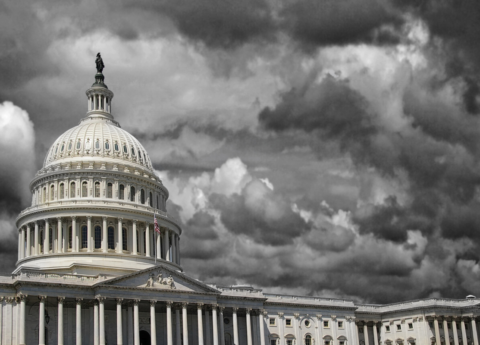Tomorrow the U.S. House is expected to release a draft bill that, by all accounts, would enact large tax cuts tilted heavily toward the wealthiest Americans and largest, most profitable businesses. Based on what is already known, here’s a round-up of the research showing how it would leave most Kentuckians worse off:
Plan Will Increase the Deficit
The House plan would increase the deficit by $1.5 trillion over 10 years, possibly even more if it uses gimmicks such as dynamic scoring and phase-ins to hide the true cost. This is likely, given the plan’s release has already been delayed as drafters grapple with how to pay for the very expensive tax cuts House leaders want to include. As history has shown, because of these hidden costs and the failure of top-heavy tax cuts to spur growth, they do not pay for themselves.
If these massive tax cuts are passed, it’s only a matter of time until the associated increase in the deficit is used as grounds for spending cuts. Already, fiscally austere budget plans from the House, Senate and Trump Administration would deeply cut spending; and we have had seven years of austerity under the Budget Control Act (2011) and sequestration.
It Would Deeply Harm Critical Investments
As described, increasing the deficit is only step one in the Congressional tax cut plan. Step two will include deep cuts to investments in economic security and opportunity for low- and middle-income Americans and Kentuckians. Broadly, there are two different kinds of programs that will face the chopping block:
- Mandatory programs provide assistance to all Kentuckians who qualify. These include Medicaid, Medicare, Social Security Disability Insurance and Income and SNAP (food assistance).
- Non-Defense Discretionary (NDD) programs include Title 1 and special education funding, housing aid, the Child Care Development Fund and more. This kind of spending is already falling to historic lows. For example, federal funds to states for job training and employment services has fallen by 40 percent since 2001.
Cuts will hurt individuals, families and communities in Kentucky and they will also squeeze the already fiscally strained state budget. Of every dollar that Kentucky invests across the state, 37 cents come from the federal government.
Cuts Are Top-Heavy
The tax plan being developed would lead to severe program cuts yet potentially provides a windfall to the wealthiest Kentuckians and Americans. Based on analysis of the “Unified Framework” tax cut plan, which is likely to share many components with the House tax bill, Kentuckians with income over $1 million would receive an average tax cut of $96,200 while anyone making less than $56,600 (the bottom 60 percent) would get an average cut of $210. Even as a share of their income, the tax cuts exacerbate income inequality: millionaires would see their after-tax income go up by 3.9 percent but the bottom 60 percent of Kentuckians would get just a 0.4 percent boost.
Rhetoric around the Unified Framework indicated it would help working families, but the details reveal it was crafted in the interest of the wealthiest individuals and largest corporations in America. For instance, because the boost to the Child Tax Credit is not refundable and wouldn’t grow with inflation, this component of the plan leaves behind the families who need assistance the most. Instead, the plan is so generous toward the wealthy that even if a major component designed for their benefit were removed – a reduction in the top individual income tax rate – the overall impact of the tax plan would still disproportionately cut taxes for the wealthiest Americans. Similarly, the plan cuts corporate taxes including the top corporate income tax rate even though America’s largest and most profitable corporations already pay a much lower effective rate than the statutory 35 percent and after-tax corporate profits are already at record highs as a share of national Gross Domestic Product.
The House plan will differ from the Unified Framework, but it would have to change dramatically to qualify as a plan that helps grow and lift the middle class without harming core investments in our communities or increasing inequality.
As Economic Policy, Cuts Won’t Work
States are testing grounds for policy ideas and Kansas is a good place to examine the impact of tax cuts designed to benefit the wealthy and corporations. In 2012, that state legislature enacted a package of tax cuts endorsed by Governor Brownback, but his promised “shot of adrenaline” never came “to the heart of the Kansas economy.” Recently, in the wake of one budget crisis after another, legislators have voted to walk back those policies and have rejected the simplistic thinking that led to the tax cuts.
More money to those at the top of the income spectrum does not trickle down to everyone else through more jobs and higher wages. With incomes at the top already soaring and corporate profits at record highs, doubling down with supply-side tax cuts won’t address the real challenges in our economy related to too little demand. Wages for typical Americans (and Kentuckians) are just now beginning to grow after two decades of stagnation, so policies should be designed to grow and lift the middle class and its purchasing power.
Furthermore, because public spending is a crucial component of demand, tax cuts that reduce our ability to invest in the building blocks of communities should be viewed with deep skepticism. Research from the chief economist at Moody’s Analytics shows higher economic stimulus effects for boosts in public spending than for tax cuts. This is especially true during recessions. Cutting taxes now and paying for them later through program cuts – particularly if mandatory programs are turned into less responsive, discretionary block grants – will hamstring the ability of the federal government to provide relief to states and communities during the next recession.
It Could Move Quickly
President Trump has expressed that he would like to sign a plan the House and Senate have agreed upon by the winter holidays. Though the Senate must go through the same process the House is now engaged in of drafting, scoring, debating and voting on a plan, and despite the delay in the House’s release of their draft bill, Congress has passed “budget reconciliation instructions” that fast track the cuts. This includes limiting time for debate and reducing the number of votes needed to pass them.



